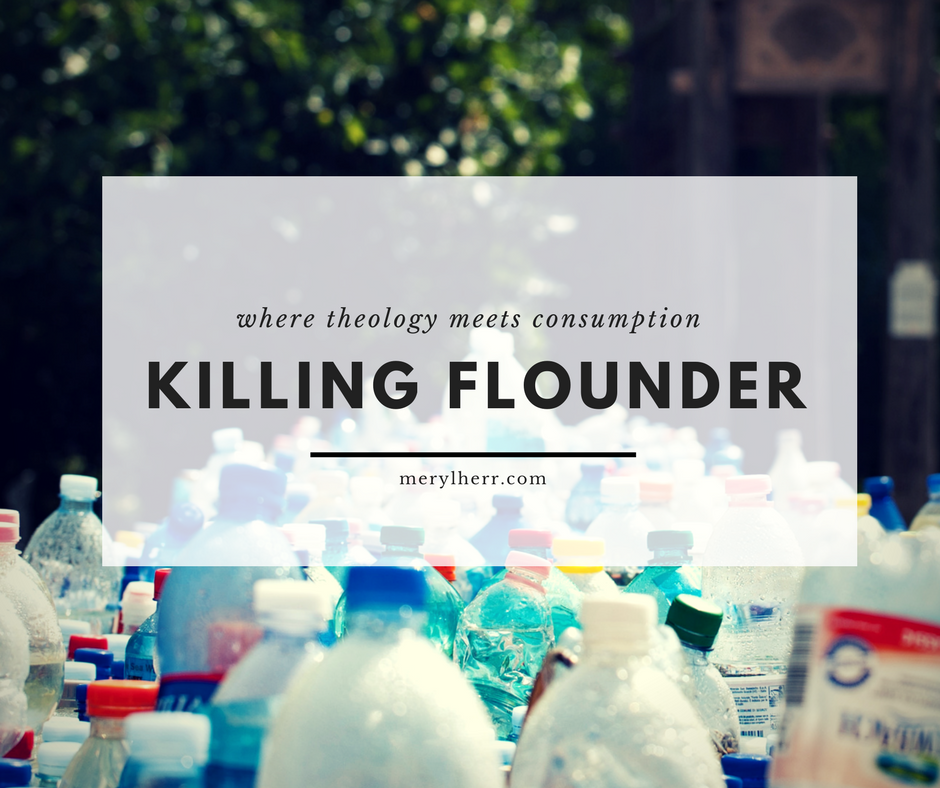Where Theology Meets Consumption
Disclosure: This post contains affiliate links. I did not receive any compensation for recommending the linked products, but I may receive a commission if you click on the link and subsequently purchase a product.
For the past few weeks, I have had a crisis of conscience every time I go to the grocery store, every time I prepare a meal, every time I give a snack to my kids. I am no stranger to these food-related troubles. Jamie Oliver has me scrutinizing school lunches. Documentaries like Forks over Knives, Super Size Me, and Food, Inc. have me increasing plant-based foods, reducing processed foods, and being vigilant against GMOs.
My newest food crisis is less about what is in my food and more about what my food is in. I am concerned about food packaging.
Recently, I read a news story about the Great Pacific Garbage Patch, an 80,000-ton floating jumble of mostly-plastic trash floating in the ocean between Hawaii and California. This massive, maritime dump covers an area double the size of Texas.
Since reading this story, I scrutinize every package. My awareness of how much non-recyclable, non-biodegradable packaging overwhelmed me in my dinner prep last night. The organic ground beef—packaged in plastic. The ground turkey—packaged in plastic. The egg noodles—packaged in plastic. The vegetables—packaged in plastic. The croutons—packaged in a foil bag. None of it could be recycled.
I am grateful that I live in a city that encourages recycling. Grand Rapids encourages its residents to recycle by making it free plus allowing us to earn points toward free services at area business when we recycle. The city charges us each time a truck collects our garbage, and our rate is set by the size of our can. Plus, Grand Rapids recycles far more items than other cities where I have lived. We can recycle plastics numbered 1 through 7, including two types of plastic bags, and glass.
Yet this Great Pacific Garbage Patch makes me want to do more. Beyond the financial incentives to recycle, I have a theological rationale to change how I consume and dispose of food packaging. The Psalmist declares, “The earth it the LORD’s and everything in it” (24:1). God created this world, and he tasked people to care for and cultivate it. Instead of intentionally caring for and cultivating our world, we often carelessly contaminate and clutter it with our waste. To borrow a phrase from Tish Harrison Warren, our garbage is “not theologically neutral.”¹
In addition to being acutely aware of the waste created through our family’s consumption, I am contemplating taking these three steps:
1. Read labels. I often shop at Aldi, and I am grateful that Aldi-brand products contain information about what parts of the packaging can and cannot be recycled. Cereal box—yes. Plastic bag in the cereal box—no.
2. Educate myself about what can be recycled. I intend to spend more time investigating specifically what can be recycled in my community. Where can I take lightbulbs? What about old cell phones and other electronics? Does it make sense to save and ship my empty broth and stock cartons to be recycled?
3. Buy fewer products that come in non-recyclable containers. My sons have loved the foil squeeze pouches that contain all manner of fruit and vegetable purees. Honestly, I have loved their convenience. But convenience can have consequences. I shudder to think how many of those little pouches in the local landfill came from our family. We do have some refillable, recyclable pouches, but I often forget about them, opting for convenience instead of the chore of filling them and later washing them.
4. Buy more in bulk. I live close to a grocery store that sells many pantry staples—nuts, grains, and dried fruit in bulk. Granted I often use the store-provided plastic bag to get my dried pineapple, oats, and bulgar wheat home, but those plastic bags are recyclable in my area. I could also investigate bringing my own containers or reusable bags to the store with me.
5. Cook more from scratch. I have neither the time nor the expertise to cook everything from scratch. But I can make some small, easy changes. Just last night my son asked if we could make homemade croutons. Sure! That would also take care of the “heels of the bread loaf” problem around our house.
Whole life discipleship means allowing God’s priorities to shape every area of my life. This week, that includes my grocery cart and my pantry. If I believe that the earth belongs to the LORD, then I need to pay attention to how my actions hinder its flourishing. In the case of the Great Pacific Garbage Patch, my floundering about consumption and recycling could actually be killing flounder.
References
¹ Warren, T. H. (2016) Liturgy of the ordinary: Sacred practices in everyday life. Downers Grove: IVP, p. 70.
